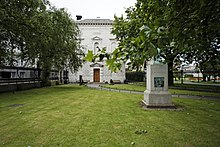Natural History Museum (Ireland)
| Ard-Mhúsaem na hÉireann - Stair an Dúlra | |

Entrance to the museum
|
|
| Established | 1856 |
|---|---|
| Location |
Merrion Street Dublin 2 Ireland |
| Coordinates | 53°20′23″N 6°15′11″W / 53.33976°N 6.252997°W |
| Type | National museum |
| Visitors | 108,615 (2007) |
| Curator | Nigel Monaghan (Keeper) |
| Public transit access |
St Stephen's Green Dublin Pearse Dublin Bus routes: 25, 25a, 44, 61, 66, 67 |
| Website | museum.ie/en/intro/natural-history.aspx |
| National Museum of Ireland network | |
Ireland's Natural History Museum (Irish: Músaem Stair an Dúlra), sometimes called the Dead Zoo a branch of the National Museum of Ireland, is housed on Merrion Street in Dublin, Ireland. The museum was built in 1856 for parts of the collection of the Royal Dublin Society and building and collection were later passed to the Irish State.
The Museum's collection and building have changed little since Victorian times, and it is sometimes described as a "museum of a museum".
The building is a ‘cabinet-style’ museum designed to showcase a wide-ranging and comprehensive zoological collection, and has changed little in over a century. Often described as a ‘museum of a museum’, its 10,000 exhibits provide a glimpse of the natural world that has delighted generations of visitors since the doors opened in 1857.
As the collection is unique in range and vintage, the exhibits are a product of their age, with faded and worn pelts and visible marks from bullets and rough taxidermy. Larger specimens are displayed in large, wood-framed glass cases while smaller ones are kept under glass, protected from sunlight by moveable leather panels. The main room is heated by an underfloor system similar to a Roman hypocaust.
The Irish Room, the ground floor of the museum, displays Irish animals, notably several mounted skeletons of giant Irish deer. Numerous skulls of those and other deer line the walls. Stuffed and mounted mammals, birds, fish — and insects and other animals native to or found in Ireland — comprise the rest of the ground floor. Many of the specimens of currently extant animals, such as badgers, hares, and foxes, are over a century old. A basking shark hangs from this ceiling.
The First floor contains mammals from around the world, including extinct or endangered species including a thylacine, a quagga, and a pygmy hippopotamus.
...
Wikipedia

